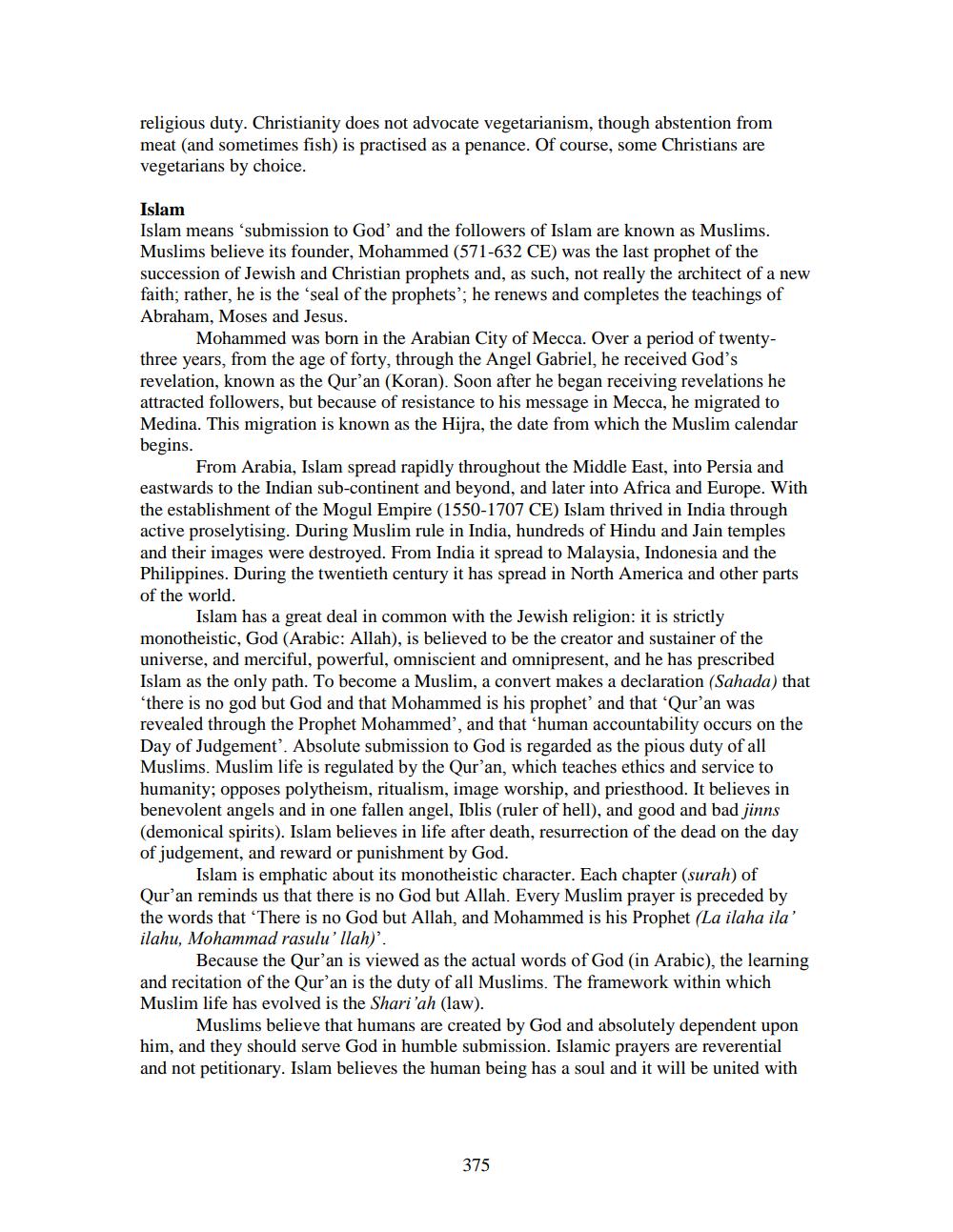________________
religious duty. Christianity does not advocate vegetarianism, though abstention from meat (and sometimes fish) is practised as a penance. Of course, some Christians are vegetarians by choice.
Islam
Islam means 'submission to God' and the followers of Islam are known as Muslims. Muslims believe its founder, Mohammed (571-632 CE) was the last prophet of the succession of Jewish and Christian prophets and, as such, not really the architect of a new faith; rather, he is the 'seal of the prophets'; he renews and completes the teachings of Abraham, Moses and Jesus.
Mohammed was born in the Arabian City of Mecca. Over a period of twentythree years, from the age of forty, through the Angel Gabriel, he received God's revelation, known as the Qur'an (Koran). Soon after he began receiving revelations he attracted followers, but because of resistance to his message in Mecca, he migrated to Medina. This migration is known as the Hijra, the date from which the Muslim calendar begins.
From Arabia, Islam spread rapidly throughout the Middle East, into Persia and eastwards to the Indian sub-continent and beyond, and later into Africa and Europe. With the establishment of the Mogul Empire (1550-1707 CE) Islam thrived in India through active proselytising. During Muslim rule in India, hundreds of Hindu and Jain temples and their images were destroyed. From India it spread to Malaysia, Indonesia and the Philippines. During the twentieth century it has spread in North America and other parts of the world.
Islam has a great deal in common with the Jewish religion: it is strictly monotheistic, God (Arabic: Allah), is believed to be the creator and sustainer of the universe, and merciful, powerful, omniscient and omnipresent, and he has prescribed Islam as the only path. To become a Muslim, a convert makes a declaration (Sahada) that 'there is no god but God and that Mohammed is his prophet' and that 'Qur'an was revealed through the Prophet Mohammed', and that 'human accountability occurs on the Day of Judgement". Absolute submission to God is regarded as the pious duty of all Muslims. Muslim life is regulated by the Qur'an, which teaches ethics and service to humanity; opposes polytheism, ritualism, image worship, and priesthood. It believes in benevolent angels and in one fallen angel, Iblis (ruler of hell), and good and bad jinns (demonical spirits). Islam believes in life after death, resurrection of the dead on the day of judgement, and reward or punishment by God.
Islam is emphatic about its monotheistic character. Each chapter (surah) of Qur'an reminds us that there is no God but Allah. Every Muslim prayer is preceded by the words that 'There is no God but Allah, and Mohammed is his Prophet (La ilaha ila' ilahu, Mohammad rasulullah)".
Because the Qur'an is viewed as the actual words of God (in Arabic), the learning and recitation of the Qur'an is the duty of all Muslims. The framework within which Muslim life has evolved is the Shari'ah (law).
Muslims believe that humans are created by God and absolutely dependent upon him, and they should serve God in humble submission. Islamic prayers are reverential and not petitionary. Islam believes the human being has a soul and it will be united with
375




